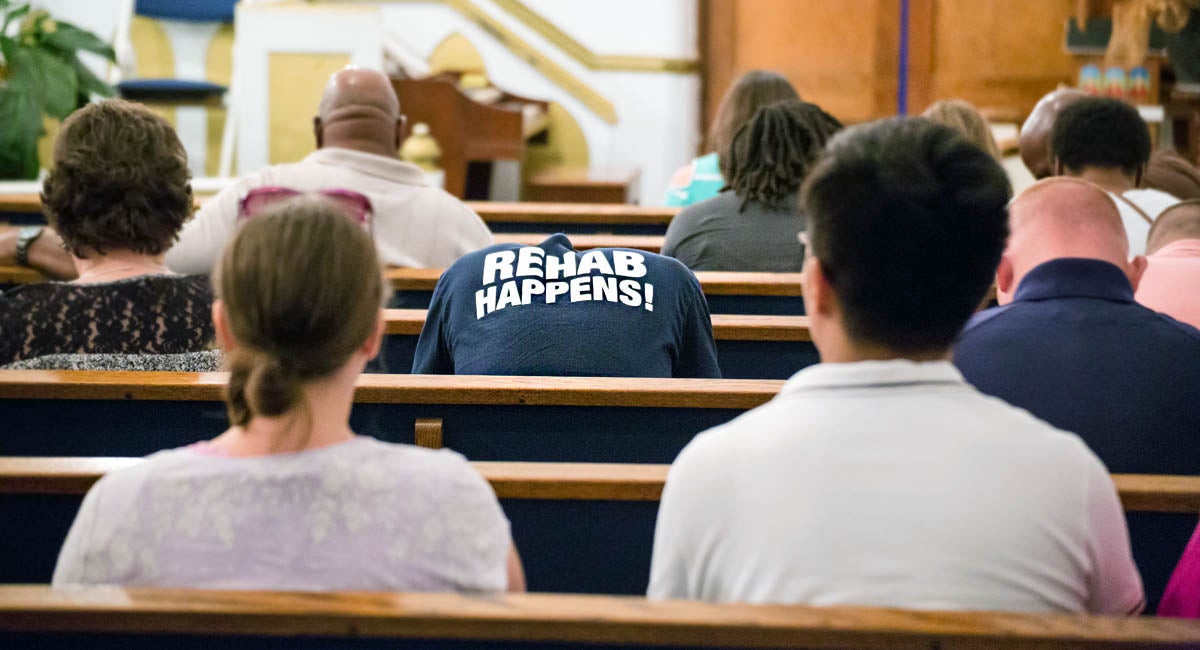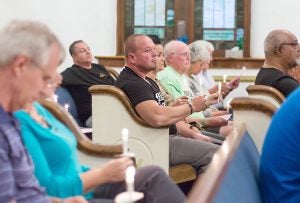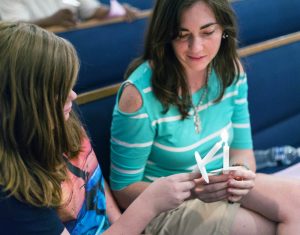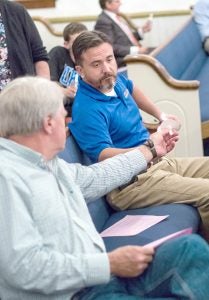Overdose awareness vigil promotes hope for addicts
Published 8:48 am Tuesday, September 5, 2017

- Denzil Hall, center with head bowed, participates in a prayer during the service.
As thousands turned their attention to the Danville-Boyle football game Thursday night, a modest crowd of around 60 gathered at St. James AME Church on Walnut Street for a candlelight vigil service held on International Overdose Awareness Day.
The service featured the testimonies of three individuals who fell into drug addiction and suffered overdoses, but have since turned their lives around.
Denzil Hall and Taylor Berault shared their local stories of what drugs caused in their lives, and Todd Barrick with Recovery Radio delivered a stirring sermon on the need for society to think differently about how it solves the current addiction crisis.
Berault shared how during her years of drug use, she overdosed 33 times. Thirty-one of those times, she was revived with naloxone, a drug that counteracts the effects of opioid drugs.
“I don’t know why I’m still here,” Berault said. “But I know I have a strong story and I hope I can make a difference.”
Barrick said there are some people who say naloxone shouldn’t be used to save the lives of drug addicts who overdose — that saving them is “enabling” them to use drugs again. But without naloxone, Berault wouldn’t be around today to share her testimony, he pointed out.
Barrick, who identified himself as a convicted felon and recovering drug addict, is also still alive today thanks to naloxone, he said.

Todd Barrick with Recovery Radio, center in black, holds lit candles with others during the service. Barrick was a featured speaker at the event.
The son of a pastor, Barrick turned to drugs early as a way to prove he was cool to other kids, he said. He experienced years of drug use, years spent in prison at Northpoint Training Center, several years of recovery, then another relapse. Now, he’s clean once again and feels God is protecting him — but he acknowledged he will always be a drug addict “’til the day I die.” It’s a matter of choosing each day not to pick the habit back up, he said.
Opioid addiction is now killing people in the U.S. at rates comparable to the deaths suffered during the Vietnam War and the rate of overdose deaths is still rising — it’s possible that in the coming years, opioid overdoses will cause more deaths than diabetes, Barrick said.
The solution is not to look down on or belittle addicts, but to offer them hope, he said.
“Addicts don’t need to hear all the bad stuff they’ve done in their life,” he said. “Addicts need to hear, ‘hey, I’m here for you; let’s get you some help.’”
The vigil was sponsored by the Boyle County Agency for Substance Abuse Policy, Families Into Getting Help Together (FIGHT), the Hope Network, Isaiah House, Recovery Radio, Stith Funeral Home and St. James AME Church.

Sarah Cheatham, right, shares the light from her candle with Aiden Cheatham during the vigil service.

Boyle County Chief Deputy Jailer Brian Wofford participates in the candlelight portion of the service. Wofford is active in assisting with multiple drug rehabilitation and prevention programs through the jail.






